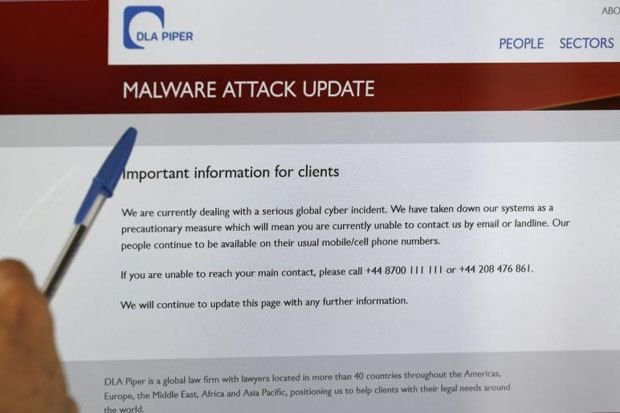A  terminal operated by AP Moller-Maersk at the Jawaharlal Nehru Port Trust, a facility near Mumbai which is India’s biggest container port, was unable to load or unload because of the attack, Neeta Prasad, a spokeswoman for the nation’s shipping ministry said by phone.
terminal operated by AP Moller-Maersk at the Jawaharlal Nehru Port Trust, a facility near Mumbai which is India’s biggest container port, was unable to load or unload because of the attack, Neeta Prasad, a spokeswoman for the nation’s shipping ministry said by phone.
The facility, called Gateway Terminal India, could not identify which shipment belonged to whom, Ms Prasad said. The attack is being carried out by the Petya virus, with users being told to pay US$300 in cryptocurrency per infected computer to unlock their systems.
The spread of the attack into Asia underscores how ransomware is becoming a routine risk of doing business around the world. While banks and retailers have strengthened defences against certain types of attacks, such as those targeting credit card data, many others are still catching up in guarding against ransomware.
About 2,000 users had been attacked as of midday Tuesday in North America (Wednesday morning in Thailand), according to Kaspersky Lab analysts, with organisations in Russia and the Ukraine the most affected.
“With there being no global kill switch for this one, we’ll continue to see the numbers rise in different parts of the world as more vulnerable systems become more exposed,” said Beau Woods, deputy director of the Cyber Statecraft Initiative at the Atlantic Council in Washington.
There were signs the virus was starting to spread in China but no large-scale outbreak had been detected, according to Zheng Wenbin, chief security engineer at Qihoo 360 Technology Co.
The attack popped up in government systems in Kiev, then disabled operations at companies including Rosneft PJSC, advertiser WPP Plc and the Chernobyl nuclear facility. More than 80 companies in Russia and Ukraine were initially affected, Moscow-based cybersecurity company Group-IB said.
Rob Wainwright, executive director at Europol, said the agency was "urgently responding" to reports of the new cyber attack. In a separate statement, Europol said it was in talks with "member states and key industry partners to establish the full nature of this attack at this time".
Kremlin-controlled Rosneft, Russia’s largest crude producer, said it avoided “serious consequences” from the “hacker attack” by switching to a backup system for managing production processes.
UK media company WPP’s website was down and employees had been told to turn off their computers and not use wi-fi, according to a person familiar with the matter. Sea Containers, the London building that houses WPP and agencies including Ogilvy & Mather, had been shut down, another person said. “IT systems in several WPP companies have been affected,” the company said in an emailed statement.
Law firm DLA Piper took down its systems as a “precautionary measure” as it dealt with the attack, meaning clients could not contact its team by email or land-line, according to a notice on its website
The most vulnerable places are “where the operators are a lot of the times at the mercy of manufacturers and providers of those technologies and there’s a long time between existence of a fix and implementation of a fix,” Mr Woods said.
Global Attack
The hack quickly spread from Russia and the Ukraine, through Europe and into the US Maersk said its customers can’t use online booking tools and its internal systems are down. The attack is affecting multiple sites and units, which include a major port operator and an oil and gas producer, spokeswoman Concepcion Boo Arias said by phone.
APM Terminals, owned by Maersk, was experiencing system issues at multiple terminals, including the Port of New York and New Jersey, the largest port on the US East Coast, and Rotterdam in The Netherlands, Europe’s largest harbour. APM Terminals at the Port of New York and New Jersey would be closed for the rest of the day “due to the extent of the system impact,” the Port said.
Cie de Saint-Gobain, a French manufacturer, said its systems had also been infected, though a spokeswoman declined to elaborate. Mondelez International Inc said it was also experiencing a global IT outage and was looking into the cause. Merck & Co Inc, based in Kenilworth, New Jersey, reported that its computer network was compromised due to the hack.
The strikes follow the global ransomware assault involving the WannaCry virus that affected hundreds of thousands of computers in more than 150 countries as extortionists demanded bitcoin from victims. Ransomware attacks have been soaring and the number of such incidents increased by 50% in 2016, according to Verizon Communications Inc.
Analysts at Symantec Corp, have said the new virus, called Petya, uses an exploit called EternalBlue to spread, much like WannaCry. EternalBlue works on vulnerabilities in Microsoft Corp.’s Windows operating system.
The new virus has a fake Microsoft digital signature appended to it and the attack is spreading to many countries, Costin Raiu, director of the global research and analysis team at Moscow-based Kaspersky Lab, said on Twitter.
The attack had hit Ukraine particularly hard and the intrusion was “the biggest in Ukraine’s history”, Anton Gerashchenko, an aide to the Interior Ministry, wrote on Facebook. Kyivenergo, a Ukrainian utility, switched off all computers after the hack, while another power company, Ukrenergo, was also affected, the Interfax news service reported
Hi! I am a robot. I just upvoted you! I found similar content that readers might be interested in:
https://sg.finance.yahoo.com/news/cyberattack-reaches-asia-targets-hit-010644294.html